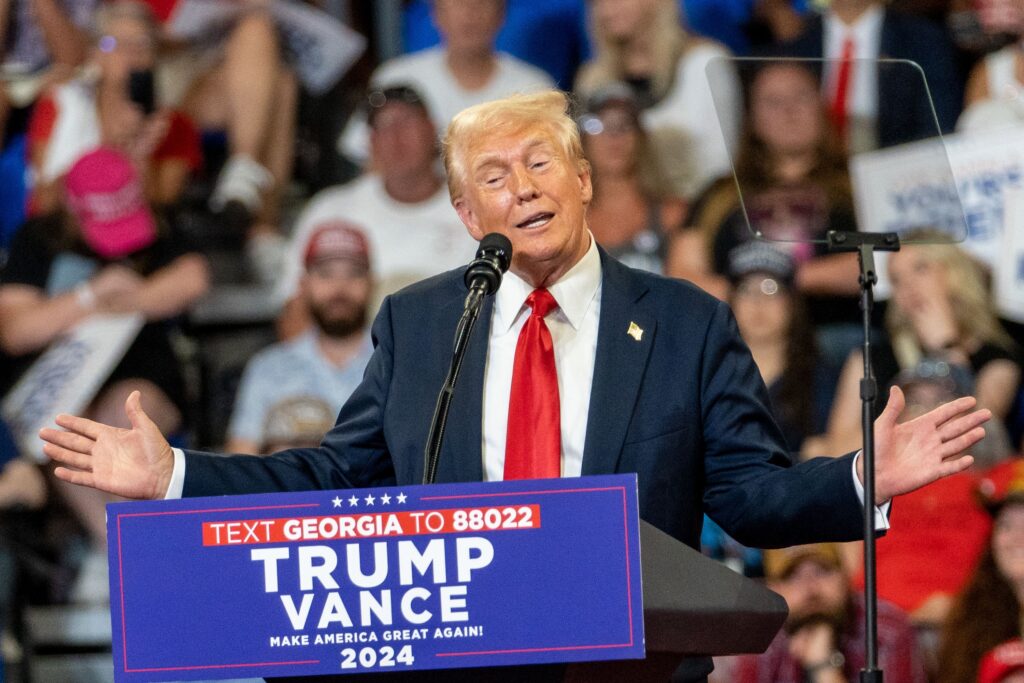Donald Trump has long believed the U.S. presidency should have near-unlimited authority. If he wins a second term, few checks will remain to limit his power.
Trump’s win over Vice President Kamala Harris turns a theoretical possibility—his potential to govern without limits—into a likely reality. Returning to the White House in January would position Trump to wield power like never before. His first term’s erosion of institutional safeguards and post-presidency legal maneuvers have weakened constraints on presidential authority.
While it’s not certain that Trump will abuse his power, his past actions suggest he’ll test the boundaries. In business and politics, he’s consistently sought to operate without constraints. With a Republican-controlled Senate, his second term could see executive power expand with little resistance.
Trump’s Control Over the GOP
A key factor in Trump’s ability to assert near-absolute control is his grip on the Republican Party. Over the years, he’s purged dissenters and reshaped the GOP around his “Make America Great Again” agenda. With a Senate majority and an uncertain House outcome, Trump’s path to enacting his agenda faces minimal pushback.
Trump’s second term also benefits from a Supreme Court ruling granting him broad immunity from prosecution for actions as president. The decision, tied to legal battles over the 2020 election, represents a major victory. The conservative-majority Court he helped shape will likely support expansive interpretations of presidential immunity, further solidifying his authority.
A Mandate for Expansive Power
Trump’s electoral win gives him a powerful claim to legitimacy. His broader support from key demographics strengthens his position, while his Electoral College success boosts his authority to act. In his victory speech at Mar-a-Lago, he declared, “America has given us an unprecedented and powerful mandate.” This statement not only asserts his political legitimacy but also frames his authority as unrestricted.
Despite claiming he’s not seeking autocratic control, Trump’s actions suggest otherwise. His proposals for mass deportations and threats to use the military against “internal enemies” reveal his approach to governance. Critics argue these moves signal a departure from democratic norms and a shift toward authoritarian control.
Evading Legal Accountability
Trump’s ability to sidestep legal consequences enhances his capacity to act without accountability. His two impeachments—one for pressuring Ukraine and another for his role in the January 6 Capitol attack—resulted in no convictions. Senate Republicans’ refusal to convict him rendered the impeachment process ineffective.
Investigations into his actions related to the 2020 election and classified documents have similarly failed to produce consequences. Justice Department rules protecting sitting presidents from prosecution may shield him from further legal threats. Trump’s history of avoiding accountability suggests he’ll continue to act without fear of legal repercussions.
The Expansion of Executive Power
Trump’s second term could significantly expand executive power. His views on presidential authority are clear, as he’s famously said, “I have an Article II, where I have the right to do whatever I want as president.” Article II outlines presidential duties, but Trump’s interpretation implies unlimited executive power.
Experts like Corey Brettschneider, a Brown University politics professor, warn the potential for abuse is real. He points to fears held by American Founders like Patrick Henry, who worried a leader with authoritarian ambitions could undermine democracy. With Trump’s history of challenging democratic norms, such concerns seem justified.
Trump’s admiration for strongmen like Vladimir Putin, Xi Jinping, and Viktor Orbán suggests he’s drawn to leaders who rule with little accountability. His praise for them signals that he may seek to emulate their model of centralized, unchecked power.
Will Trump Face Any Constraints?
The most effective check on presidential overreach is the president’s own restraint. However, Trump’s persona is defined by his rejection of limits. His second term leaves little incentive for moderation, given he’s no longer concerned with reelection.
The House of Representatives could serve as a counterbalance if Democrats retain control. They could investigate and challenge his decisions, but with Republicans likely reclaiming the chamber, effective oversight is unlikely.
Courts could also check his power. Legal challenges to his executive actions—like immigration policies—might slow his agenda. However, Trump’s conservative judicial appointees and a conservative Supreme Court may limit the effectiveness of legal opposition.
Trump’s pattern of replacing officials who resist him—like former chief of staff John Kelly and former Defense Secretary Mark Esper—suggests he’ll continue appointing loyalists to key positions. This approach increases his control within the executive branch, further reducing checks on his authority.
The Fate of American Democracy
The future of American democracy could hinge on Trump’s actions during his second term. Protests and legal challenges may arise in response to his policies, but history shows these efforts often fail to stop a determined president. The U.S. government’s design assumes leaders will act with virtue, but a president without such virtue can easily manipulate the system.
If Trump uses his second term to push the boundaries of executive power and undermine democratic norms, U.S. democracy may face serious threats. Whether any institution or individual can effectively limit his power remains uncertain. His second term could be one of the most consequential—and potentially authoritarian—periods in U.S. history.
